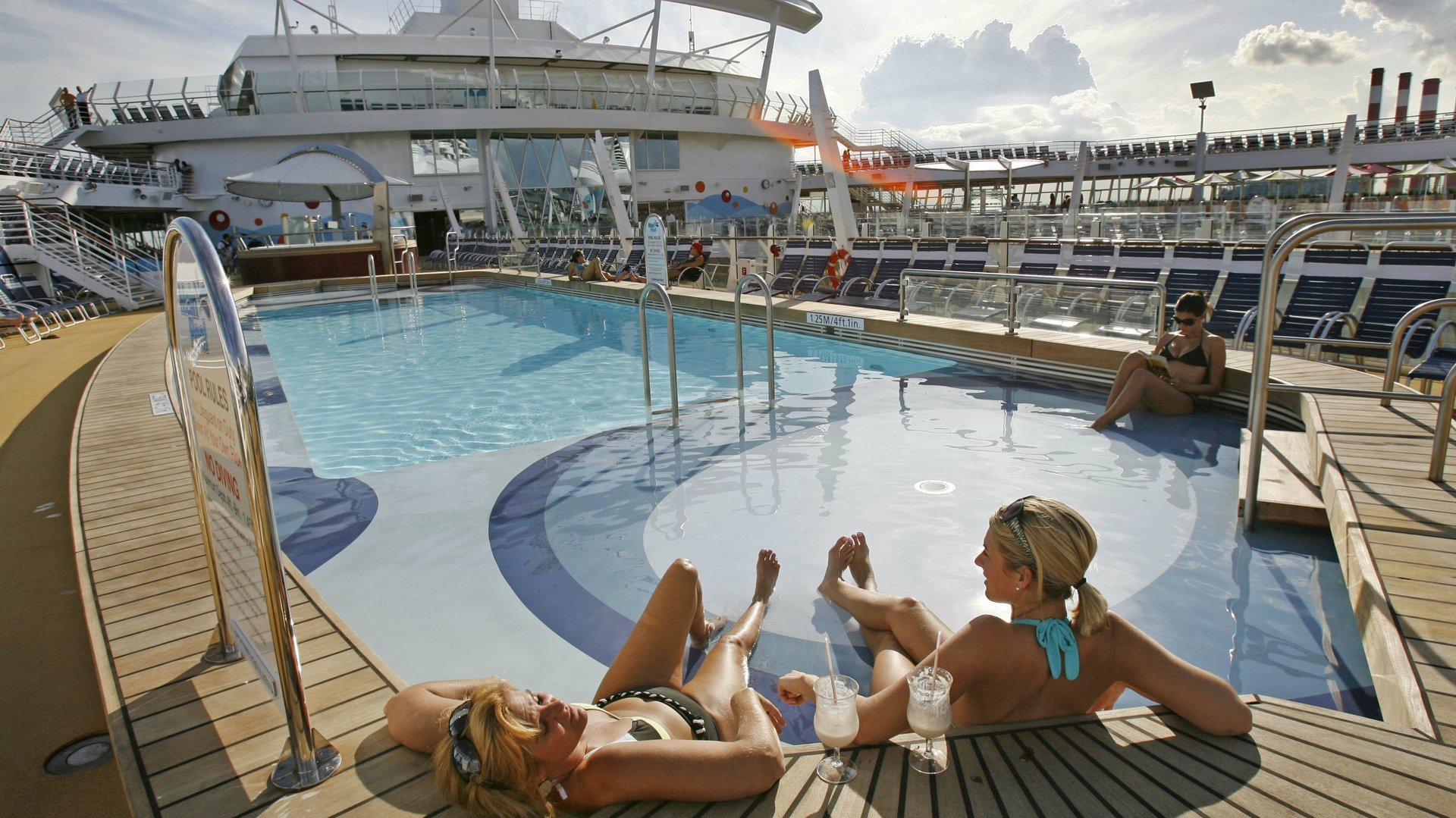Everything you need—but don’t want—to know about getting sick on a cruise ship
It’s a news item to make any traveler’s stomach turn: For the second time in one month, hundreds of passengers on a Royal Caribbean cruise ship have fallen ill with a highly contagious gastrointestinal (GI) illness.


It’s a news item to make any traveler’s stomach turn: For the second time in one month, hundreds of passengers on a Royal Caribbean cruise ship have fallen ill with a highly contagious gastrointestinal (GI) illness.
The first was in early December on the Ovation of the Seas, sailing from Singapore to Australia, where more than 200 people became sick and five were hospitalized. The most recent was this past week, when the Independence of the Seas ship returned to Port Everglades, Florida with 332 affected individuals.
On the face of it, it’s not hard to see why cruise ships are ideal breeding grounds for GI illnesses like norovirus to thrive and multiply. Close quarters where lots of people are touching the same objects—think handrails, buffet utensils, elevator buttons—and eating the same food mean if a few infected individuals board the boat, the chances of the highly contagious condition spreading are high. While the causal agent of the most recent GI outbreak has not yet been verified by the CDC as norovirus, more than 90% of diarrheal-related outbreaks on cruise ships ultimately have norovirus as their cause.
So should the squeamish among us never step foot on a cruise ship? While the risk of GI illness at sea does indeed exist, the risk is not necessarily any higher than in similarly close-quartered conditions on land. Indeed, part of the reason we associate cruise ships with norovirus is because each time an outbreak happens, ships are obligated to report it, and thus it tends to hit the news, unlike, say, when it happens at a school, resort, or workplace, which do not face such scrutiny.
The CDC runs the Vessel Sanitation Program (VSP), which assists the industry in curbing the spread of onboard GI illnesses and also performs “periodic, unannounced operational sanitation inspections.” According to their data: “from 2008 to 2014, 74 million passengers sailed on cruise ships in the Vessel Sanitation Program’s jurisdiction. Only 129,678 passengers met the program’s case definition for acute gastrointestinal illness and only a small proportion of those cases (1 in 10) were part of a norovirus outbreak.” The CDC also notes that incidences of norovirus have multiplied in general since 2001 in tandem with the number of people vacationing aboard cruise ships. For all those reasons, we tend to hear about cruise ship outbreaks more often.
So what’s a cruise lover to do? The VSP’s jurisdiction covers all ships with more than 13 passengers that have a foreign itinerary including US ports. If your cruise falls under those conditions, the VSP offers a scorecard which allows you to search the cruise line as well as the specific ship you’re thinking of booking for any low scores. The scoring system is out of 100, and anything below 85 is considered unsatisfactory. Best of all, VSP systems are highly detailed and data packed.
You can also see if your chosen cruise line or ship has had any outbreaks recently. The VSP requires all participating ships that are sailing from a foreign port to a US port to report any incidence (including none at all) of diarrheal disease at least 24 hours before arrival.
On its website, the VSP posts details of any GI outbreak where the percentage of passengers and crew who reported symptoms of diarrheal disease to medical staff was 3% or higher (with a minimum passenger count of 100). Including the most recent Royal Caribbean outbreak—where the percentage of passengers affected was about 6%, according to a Royal Caribbean spokesman—there have been 11 qualifying cases this year.
It’s important to note that boarding a ship with a history of high scores does not guarantee that an outbreak won’t occur; indeed the Independence of the Seas’ most recent score was a near-perfect 98. So once you’re aboard the ship, your precautionary measures are really just beginning. Washing your hands is the most effective measure, according to both the CDC and the official guidance provided by Royal Caribbean to passengers aboard the Independence of the Seas (seen in the Tweet above). You should pay particularly special attention to hand-washing when it comes to eating, drinking, smoking, touching your face, and, of course, using the bathroom. Hand sanitizer is also advised, but only in situations where hand-washing is not available.
In addition, if you see someone who is ill—whether there is a known outbreak or not—it’s best to vacate the area and alert staff immediately, according to CDC guidance. If an outbreak has been announced, passengers are generally advised to stay in their rooms while sanitation measures take place. While this is certainly not how you might’ve imagined spending your holiday, it’s better than getting ill.
Lastly, once you’ve disembarked, it’s good to investigate your options as far as a refund. According to Cruise Critic, a UK-based cruise review community, “Cruise lines are not required to compensate guests who fall ill on a voyage. However, cruise lines will generally compensate passengers whose voyage is altered or canceled due to an outbreak.” Check with your provider for details.